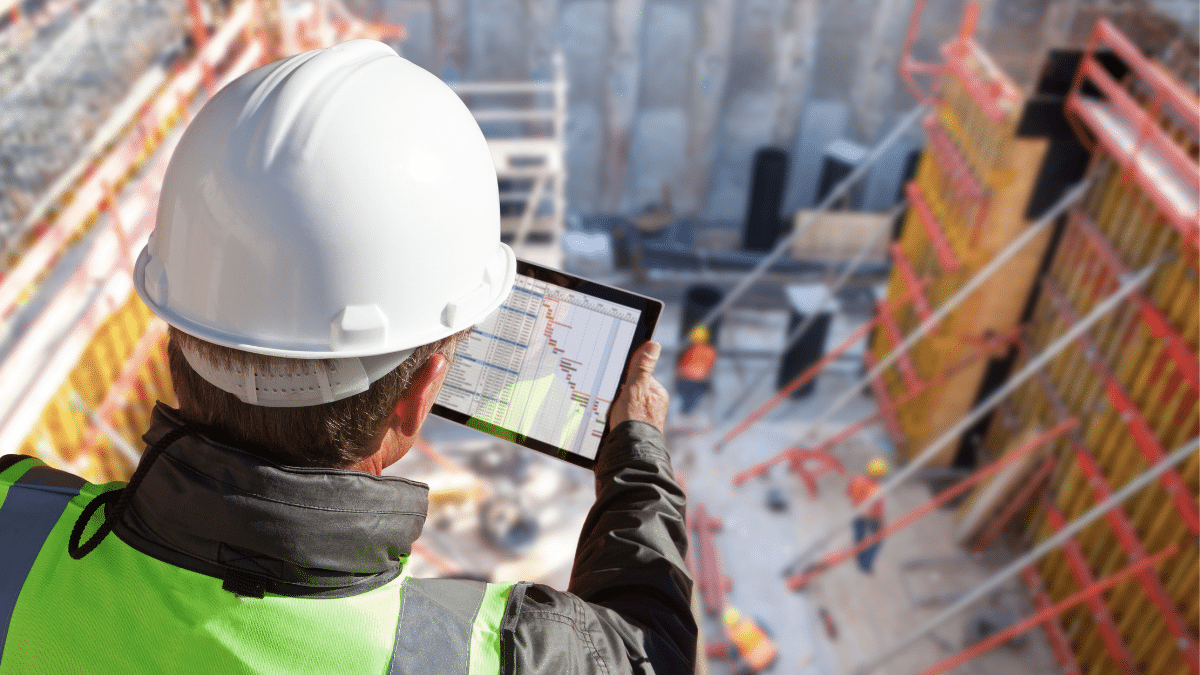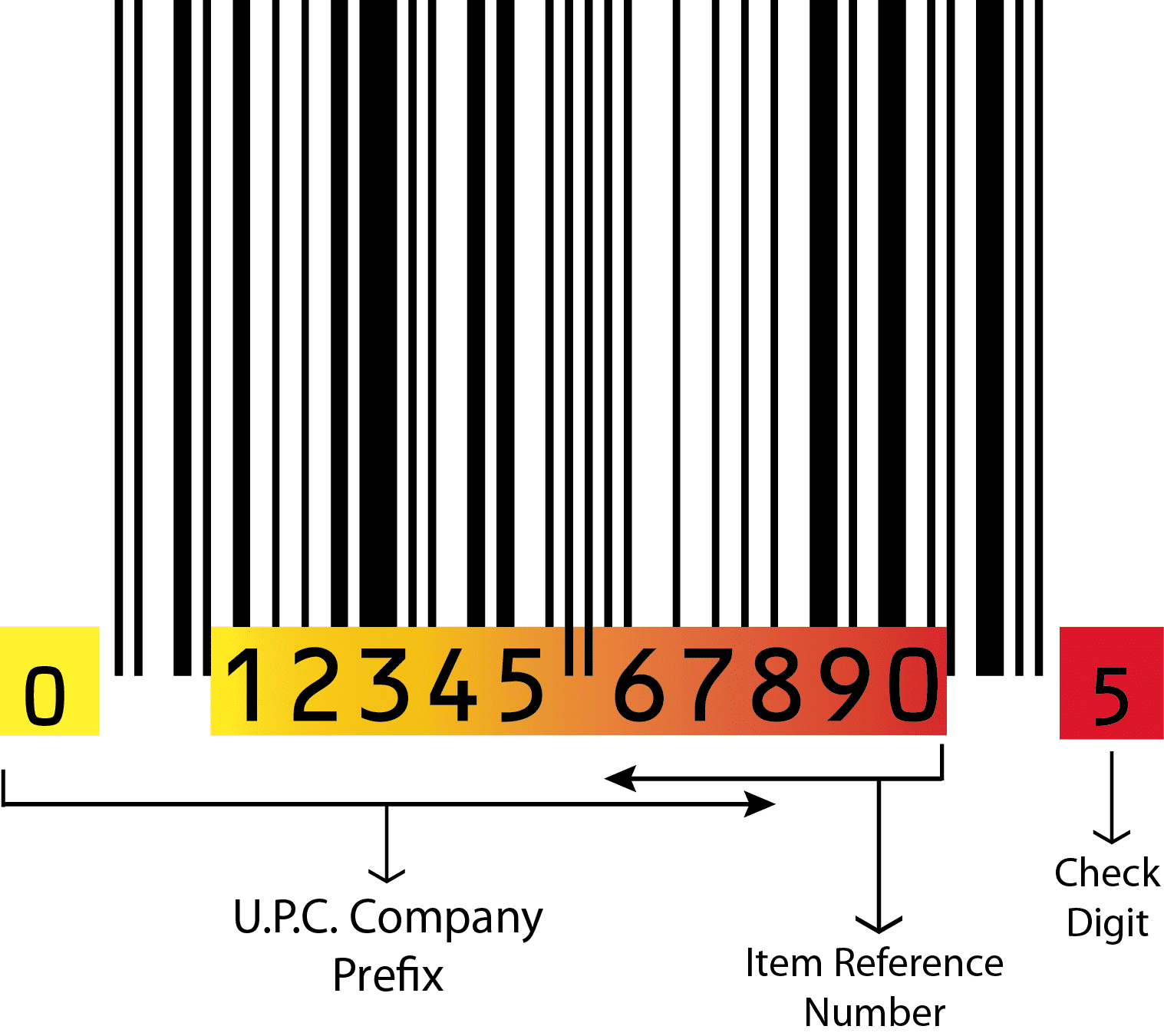Key Takeaways:
- Reporting theft to the police with key details—including equipment location if tracked—is the first step in recovering stolen equipment.
- GPS tracking has helped recover $3–$5 million worth of stolen equipment in Maryland, highlighting its effectiveness.
- Stolen equipment is most often recovered within 65 miles of the theft location.
- Alerting equipment registries, searching online markets, and notifying local businesses and community—potentially offering a reward—can improve recovery chances.
Having your valuable construction equipment stolen is a major setback, both financially and in terms of productivity.
But don’t despair—stolen property is recovered all the time, often not far from where the theft occurred in the first place.
So, whether you’ve just experienced a theft, know someone who has, or simply want to be ready just in case, read on.
In this article, you’ll find plenty of actionable tips on what to do in these situations.
In this article...
Report the Theft Immediately
The first thing you should do if your valuable equipment is stolen is to notify the police as soon as possible.
Time is of the essence here, and the sooner you react, the higher the chances of recovery before the asset is moved or sold.
When reporting the theft, ensure the person making the report is familiar with the equipment and has all the key details ready.
According to the National Equipment Register, here’s what you should have on hand:
- Year
- Size
- Model
- Color
- Manufacturer
- Unique markings
- Photos (if available)
- Attachment serial numbers (if applicable)
- Product Identification Number (PIN) or serial number
- Explanation of the circumstances of the theft
Plus, if the asset has a QR code asset tag, share its details with law enforcement, too.
As shown in the example below, they are typically customized with your company name and contact information, which helps verify ownership and expedite recovery.
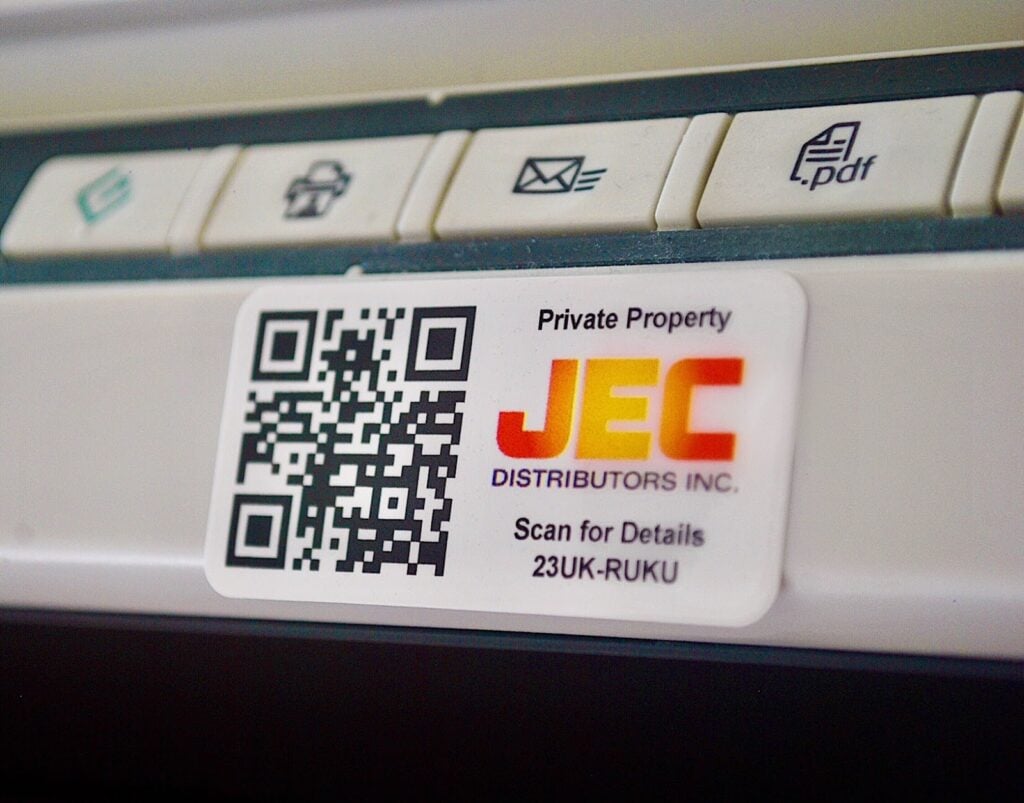
Source: GoCodes
Once the report is filed, don’t forget to record your crime reference number.
You’ll need this number for several things, including:
- Filing an insurance claim
- Tracking the progress of the investigation
- Proving ownership if the equipment is found
With this first step completed, you’ll be much closer to getting that stolen piece of equipment back.
However, there are still plenty of things you can do to boost your chances even further.
Use Asset Management Software to Track Equipment Location
If you have asset management software, you can provide the police with another vital piece of information: equipment location.
These systems integrate with various types of tracking devices and tags, enabling either real-time or near real-time monitoring.
Take, for example, our own asset management system, GoCodes.
When signing up for our solution, you can choose QR code labels, GPS trackers, or both, which then pair with the software.
GoCodes QR code labels automatically capture GPS location whenever scanned with our mobile app—such as during asset check-in or check-out—creating a log of equipment use and movement.
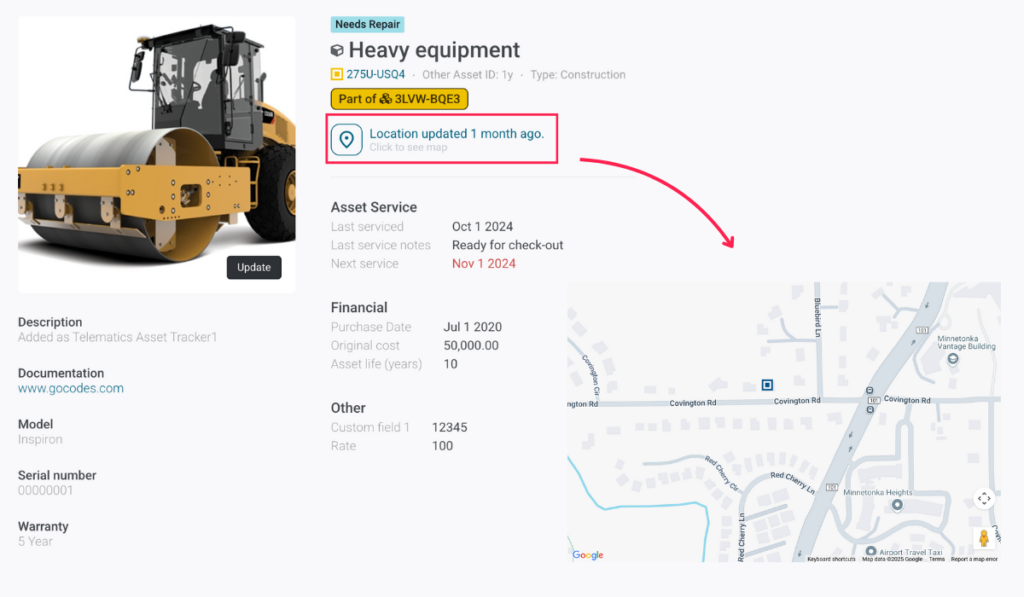
Source: GoCodes
This can help pinpoint when and where a theft occurred.
GPS tracking, however, is more advanced, providing real-time location updates so you can see asset movement as it happens.
This can assist the police in immediate recovery efforts.
In 2024, a contractor in Sterling, Virginia, used exactly this technology to recover not only his stolen tools but thousands of others.
His report led to a massive investigation in Howard County, Maryland, uncovering $3–$5 million worth of stolen equipment—over 15,000 pieces.
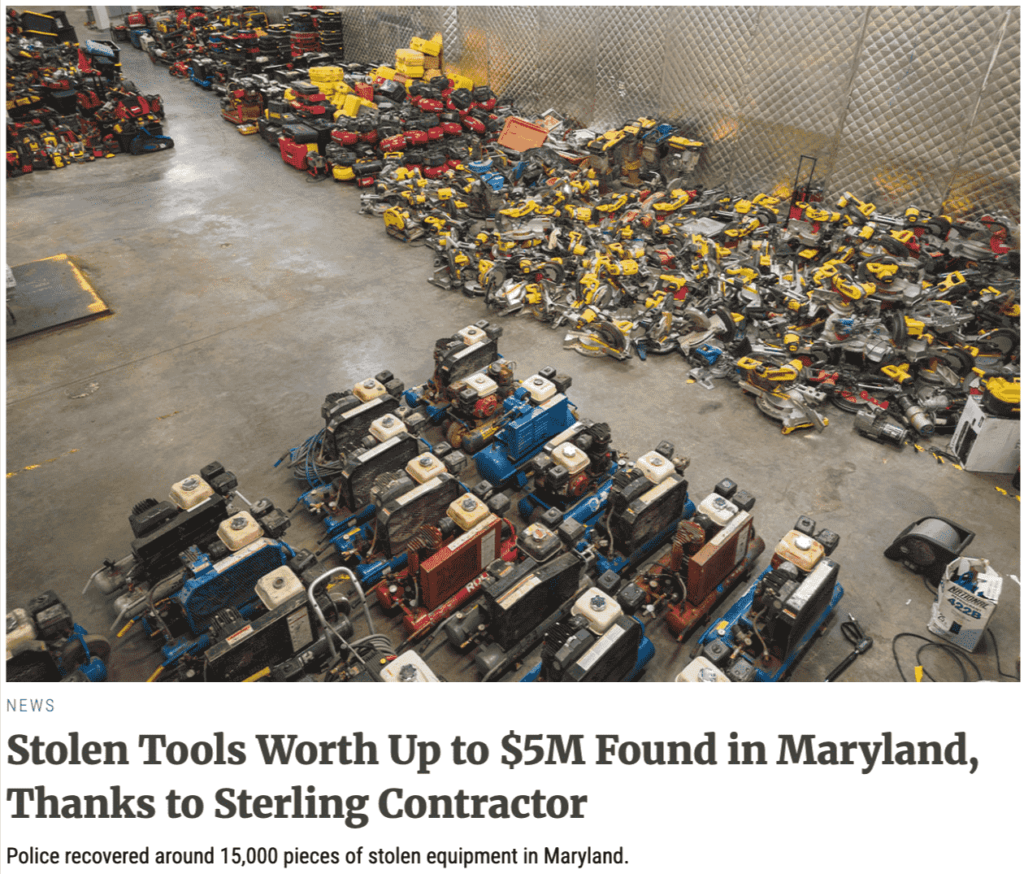
Source: Northern Virginia Magazine
The case identified at least 80 victims, with possibly thousands more.
The bottom line?
Whether real-time or last known, asset location data makes a significant difference in theft investigations.
If you have this information, be sure to share it with law enforcement.
Alert Equipment Registries
Another way to increase your chances of recovering stolen assets is by alerting equipment registries.
These databases store various important asset details, such as ownership records or theft reports, and work closely with law enforcement and equipment dealers to track down stolen assets.
Depending on where you’re located, you can use registries like:
- National Equipment Register (NER) – United States
- The Equipment Register (TER) – Europe
- PropertyVAULT – Australia
These registries house millions of records and have been game-changers in asset recovery.
Take NER, for example.
Their massive database doesn’t just log theft reports but also leverages a unique process to identify stolen machines.
“We collect multiple points of identification for a single machine and apply a unique search algorithm to find possible matches in the database of over 100,000 equipment theft reports.”
Ryan Shepherd, General Manager of Crime Analytics and Supply Chain Solutions at Verisk (which oversees NER), maintains that these registries are highly effective.
In fact, he says insurance companies believe in them so much that they offer major incentives for using them, with some even waiving up to $10,000 in theft deductibles for registered equipment.
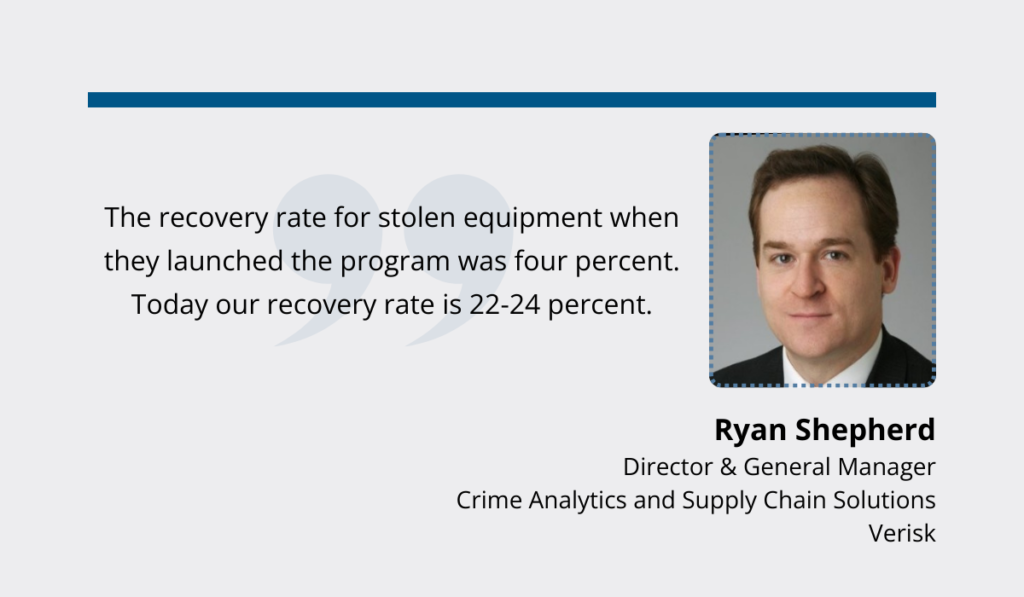
Illustration: GoCodes / Quote: CON/AGG
That’s quite a strong reason to consider using equipment registries.
Just be sure to check their specific requirements before reporting a theft.
For instance, NER requires a police report number to classify a case as “theft”; otherwise, it’s just marked as “missing.”
Search Online Marketplaces
After reporting the equipment theft, you don’t have to just sit and wait for it to be found—there are certain proactive steps you can take.
One thing you can do is check online marketplaces like Craigslist, Facebook Marketplace, eBay, and auction websites for listings that match the stolen equipment’s description.
Jason Brewer, Executive VP of the Retail Industry Leaders Association, explains why thieves flock to such websites so frequently:
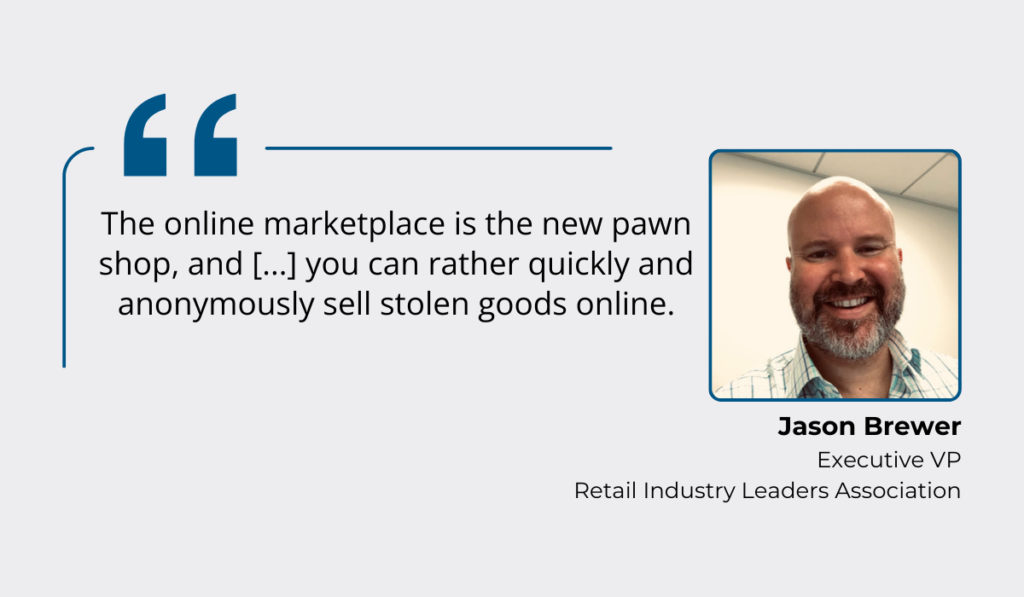
Illustration: GoCodes / Quote: News Nation
A recent case in Texas proves just how effective this tactic can really be.
In March 2025, White Settlement and Dallas Police recovered over $150,000 in stolen equipment—all thanks to the victim spotting a suspicious listing on Facebook Marketplace.

Source: Hoodline
The White Settlement Police Department shared in a Facebook post:
“During the investigation, the victim of the theft noticed several items of his stolen property for sale on Facebook marketplace.”
From there, detectives were able to identify the social media profiles associated with stolen equipment for sale and obtain a search warrant.
Now, you don’t have to manually search through these websites.
You can also set up alerts for items similar to your stolen property so that you automatically receive notifications if something matching your asset appears online.
On this website, you can find tips on how to set up these alerts on different platforms.
Here’s one crucial warning, though.
If you come across a suspicious listing, don’t confront the seller yourself. Instead, report it to law enforcement.
You can gather all relevant details and print out the listing, but then let the professionals take it from there.
Check Nearby Scrap Yards
When equipment gets stolen, it often doesn’t stay intact for long.
Thieves know they can quickly dismantle it and sell the parts at scrap yards, making these places a prime spot to check if you’re trying to recover stolen goods.
For example, in 2014, authorities discovered more than $500,000 worth of stolen items at a scrapyard in Oxford Township.

Source: Newark Advocate
The haul included everything from boats and furniture to cars and semi-truck rigs.
More recently, in 2024, a Marlboro County man was arrested at a scrapyard with stolen property, confirming that these locations are still frequently used by thieves.
Pawn shops should also be on your radar.
Just like scrapyards, they are prime spots for those who want to sell stolen items quickly and anonymously.
For instance, in 2018, Rio Hondo police recovered city-owned tools from a local pawn shop.
Former City Manager Ben Medina explained that police cross-referenced serial numbers in a pawn shop database, leading them to the stolen property at a pawn shop in San Benito.
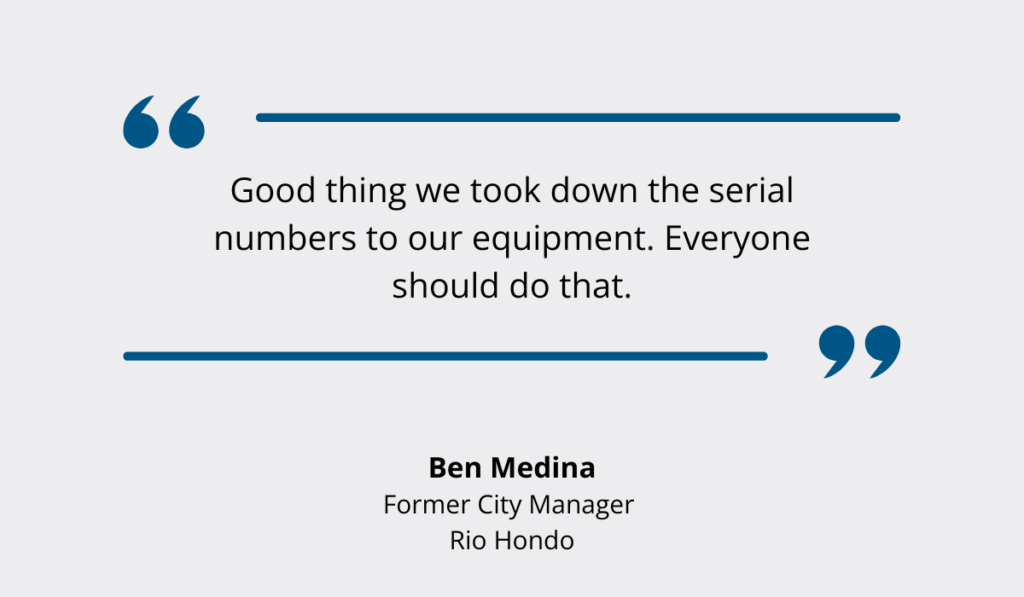
Illustration: GoCodes / Quote: AP News
And he’s absolutely right.
If you’re on the hunt for stolen equipment, don’t go in empty-handed.
Bring photos, serial numbers, and detailed descriptions when visiting scrap yards and pawn shops.
Many businesses keep transaction records and are quite good at noticing suspicious sellers.
You just need proof that the stolen asset actually belongs to you.
Notify Nearby Equipment Dealers
In addition to scrap yards and pawn shops, construction equipment dealerships, rental companies, and repair shops are also typically targeted by thieves looking to sell stolen gear.
That’s why reaching out to local businesses and getting them involved in the watch can make a huge difference in speeding up asset recovery.
Did you know that, according to a 2024 BauWatch report, 40% of construction site crimes are committed by opportunists?
Illustration: GoCodes / Data: BauWatch
These are the thieves who take advantage of easy targets.
They’re not planning elaborate break-ins. Instead, they act on impulse, looking for quick and easy ways to make money.
And because they aren’t tied to organized crime rings, these opportunists are eager to offload stolen assets fast, often selling them to rental companies or other businesses nearby.
Here’s another interesting fact: The National Equipment Registry shows that stolen equipment is most often recovered within 65 miles of the theft location.
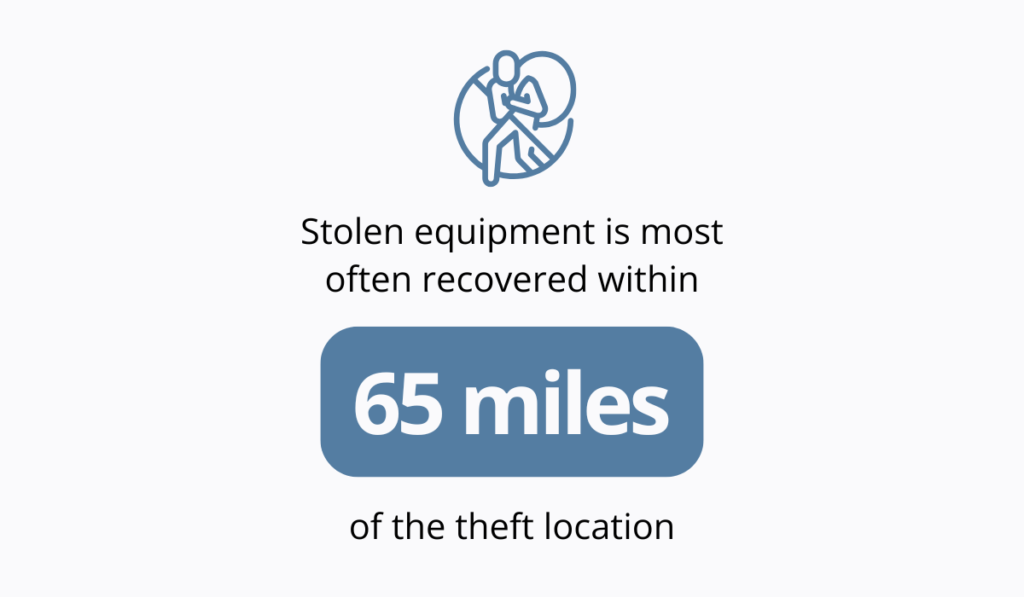
Illustration: GoCodes / Data: NER
That’s right, opportunistic thieves tend to stay close to the scene.
They want fast cash, so they sell locally.
That’s why it’s so important to alert your local businesses.
The more people on the lookout, the harder it becomes for thieves to get away with their stolen equipment.
It’s all about working together to make the thief’s job harder.
Consider Offering a Reward
A cash reward can be a powerful motivator for tipsters to come forward with information about stolen equipment, especially if the theft occurred in a busy area with many potential witnesses.
And community tips can be incredibly effective.
For example, in 2024, Statesboro police arrested a suspect in the theft of two skid steer machines worth over $100,000, thanks to crucial tips from local citizens.
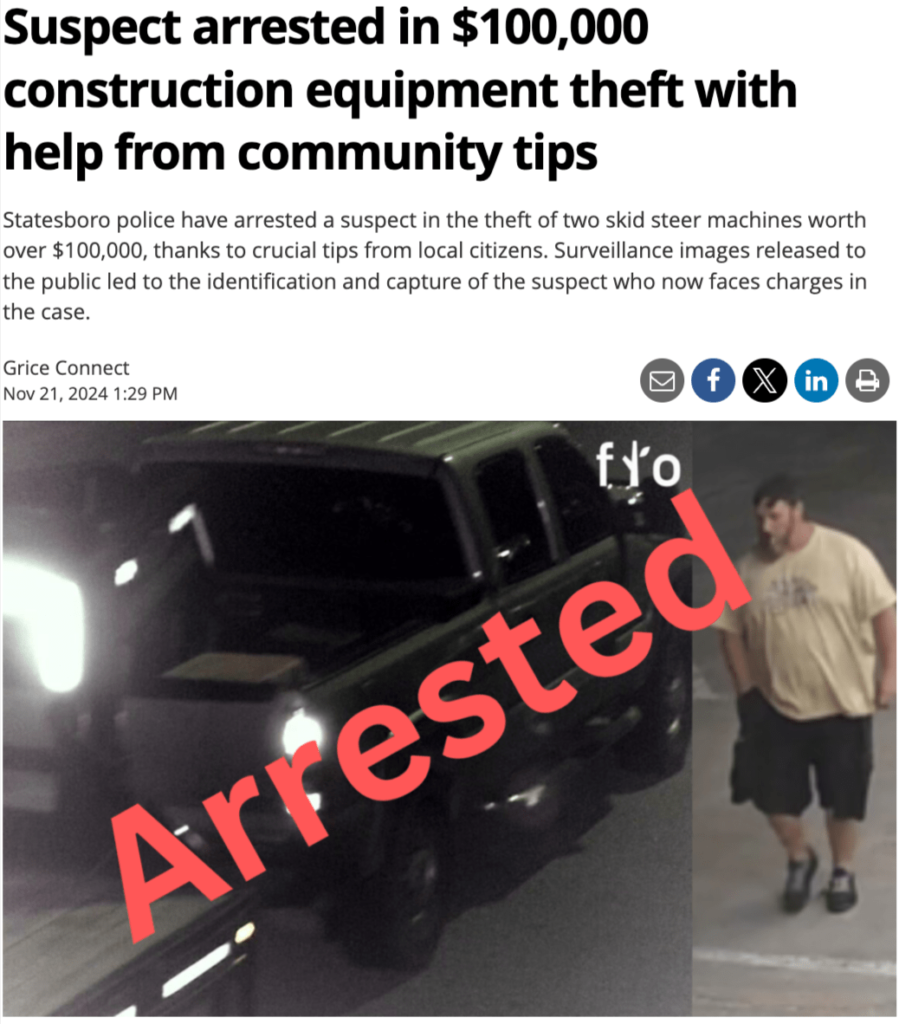
Source: Grice Connect
The Statesboro Police expressed gratitude to the community for their assistance, noting that public engagement was key in moving the case forward.
However, if you’re considering using this approach, it’s important to communicate everything clearly, from how tips should be reported to any conditions attached.
Here’s a checklist of what to include:
| Equipment Details | Make, model, serial number, unique markings, and any distinguishing features |
| Circumstances of Theft | Specifics about when and where the theft occurred |
| Reward Amount & Conditions | For example, a reward could be contingent on the recovery of the equipment |
| Anonymity & Confidentiality | Allow for anonymous tips if necessary |
| Contact Information | Provide a dedicated tip line or email (preferably a law enforcement tip line or third-party service like Crime Stoppers) |
By providing clear instructions, you’ll reduce confusion and miscommunication, helping the police properly handle legitimate leads and recover your stolen equipment.
Below, you’ll see an example of how to do this effectively.
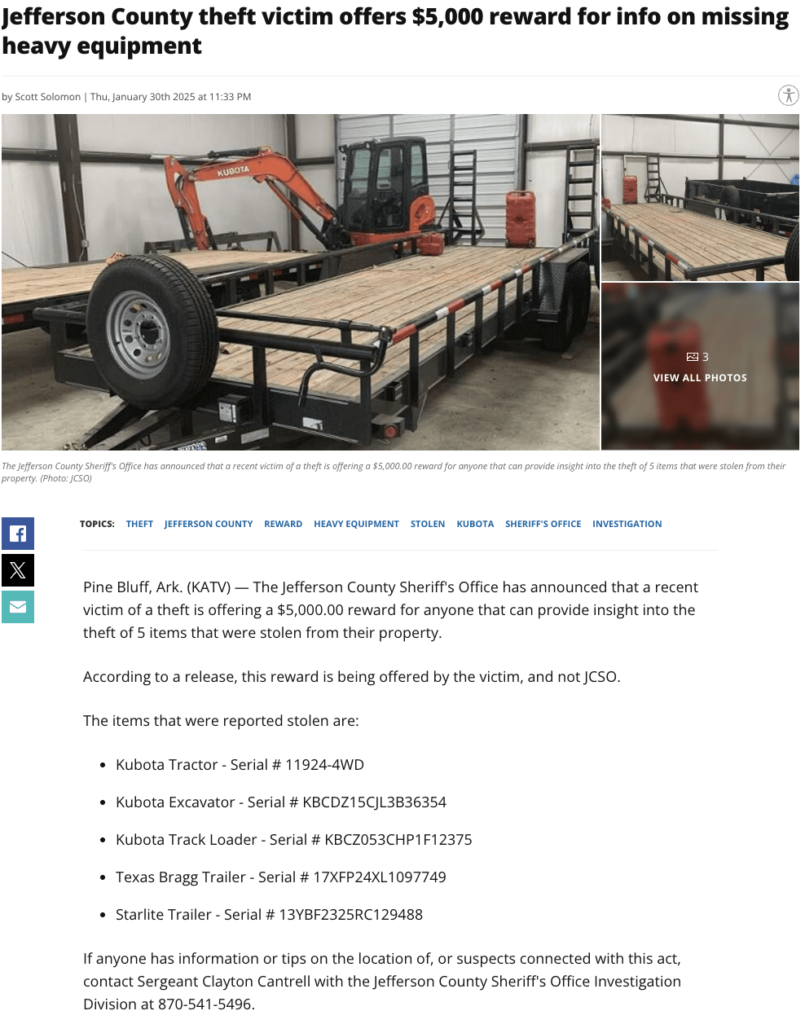
Source: KATV
Overall, people are generally inclined to help in situations like these, but offering a reward adds that extra incentive.
This, naturally, boosts the chances of a quick recovery.
Conclusion
Yes, having your equipment stolen is a daunting experience no one should have to deal with.
But here’s the good news:
By staying vigilant and teaming up with law enforcement, local businesses, and the community, you can seriously boost your chances of getting your assets back.
And to boost future security, consider tagging your assets with tracking devices and monitoring their usage and movement through asset management software—if you haven’t already.
This can make all the difference in both catching perpetrators and potentially deterring future thefts.




